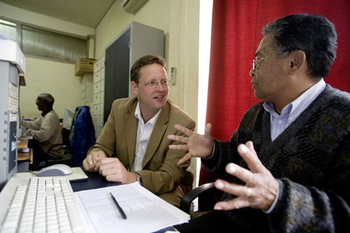Advisory Services for the Ministry of Finance
Project description
Title: Advisory Services for the Ministry of Finance
Commissioned by: German Federal Ministry for Economic Cooperation and Development (BMZ)
Country: Madagascar
Lead executing agency: Ministère du Budget et des Finances
Overall term: 2004 to 2010
Context
After overcoming the domestic political crisis of 2002, a comprehensive reform process was launched in Madagascar under the new President, Marc Ravalomanana, in which government finance reform is a particularly high priority. The new poverty reduction strategy adopted in 2006 (Madagascar Action Plan, MAP) reiterates the urgency of reforming public finances in the areas of budgeting, budget implementation and fiscal decentralisation. In order to successfully implement MAP, it is also important for public funds to reach the local level and to have a pro-poor impact.
The government is currently facing great difficulties in controlling its funds efficiently in line with MAP’s priorities. It cannot provide sufficient information either to itself or to parliament and donors on where the funds go and what effect is achieved. Moreover, there is no reliable legal and institutional framework to ensure that the funds made available from the national budget are distributed to the subnational local authorities.
Objective
The public resources are controlled and used more transparently and more efficiently. The legal and institutional framework for the target-orientated control of public funds at central government and subnational level is improved.
Approach
The control of public funds at central government level is improved.
Organisational and process consultancy promotes regular dialogue between Ministry decision-makers and internal coordination. The basis for improved planning within the Ministry of Finance and Budget (MFB) and the foundation for more extensive dialogue between the Ministry of Finance and the expending ministries are created at the same time, thus strengthening the link between poverty reduction strategy and the budget. The budget documents for 2009 should become more transparent and should be drawn up in a more efficient and more participative process.
Efficient financial administration systems at decentralised level are promoted using a number of approaches.
At national level, the government decentralisation strategy including its fiscal components is supported by providing advisory services on the distribution of tax revenues and on developing the institutional framework. For the transitional phase, work is being done on developing instruments that can be applied quickly and which partly take over the functions of financial equalisation between central government and local authorities. The advisory services will enable the municipalities to reform the legal framework and to strengthen their financial power autonomously, thus becoming more independent from the central government. An information system to provide regular and comprehensive information on the municipalities’ financial situation has been under development since the end of 2007. On the one hand, this information is used to control the municipalities’ finances. On the other hand, an improved situation regarding information is a prerequisite for transparent, rational decision-making in distributing public funds.
Donor harmonisation
The project contributes to implementing the Paris Declaration on Aid Effectiveness (2005). It is involved in revising harmonised donor procedures for budget support (Cadre de Partenariat), which is to be completed in 2008. With assistance from KfW Entwicklungsbank, indicators have been introduced for environmental policy, a focal area of German-Madagascan cooperation, and for good governance.
Results achieved so far
House and land taxes have been reintroduced in order to improve the municipalities’ funding. The reformed legal framework enables municipalities to raise land taxes themselves using simple means. Since early 2007, the necessary instruments and procedures have been taught in training courses and systematically transferred throughout Madagascar on this basis. The further training material required was developed by the project. The pilot municipalities have already improved their income situation considerably, thereby gaining greater autonomy from the government. Citizens can exert a direct influence on the use of funds through the municipal council and by electing the mayor. The government budget will become considerably more transparent as a result of the reform presented by the Minister of Finance in April 2008. On the one hand, the planning processes within the administration will improve, and on the other, the parliament will have more potential for control. The fact that the reform was finally put on the agenda after many unsuccessful attempts is largely the result of the project’s activities.

The project has contributed to enabling a consistent legal framework to be created for the relationship between the central government and local authorities. All the central provisions for the division of domestic authority are to be brought together in a single text for the first time. The need for comprehensive new regulations was expressed by the project’s advisory services. The draft law is to be presented by parliament in early 2009.